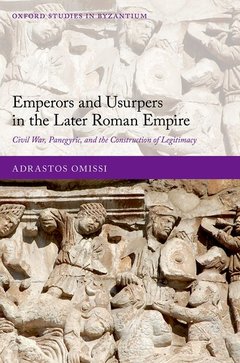Emperors and Usurpers in the Later Roman Empire Civil War, Panegyric, and the Construction of Legitimacy Oxford Studies in Byzantium Series
Langue : Anglais
Auteur : Omissi Adrastos

One of the great maxims of history is that it is written by the victors, and nowhere does this find greater support than in the later Roman Empire. Between 284 and 395 AD, no fewer than 37 men claimed imperial power, though today we recognize barely half of these men as 'legitimate' rulers and more than two thirds died at their subjects' hands. Once established in power, a new ruler needed to publicly legitimate himself and to discredit his predecessor: overt criticism of the new regime became high treason, with historians supressing their accounts for fear of reprisals and the very names of defeated emperors chiselled from public inscriptions and deleted from official records. In a period of such chaos, how can we ever hope to record in any fair or objective way the history of the Roman state? Emperors and Usurpers in the Later Roman Empire is the first history of civil war in the later Roman Empire to be written in English and aims to address this question by focusing on the various ways in which successive imperial dynasties attempted to legitimate themselves and to counter the threat of almost perpetual internal challenge to their rule. Panegyric in particular emerges as a crucial tool for understanding the rapidly changing political world of the third and fourth centuries, providing direct evidence of how, in the wake of civil wars, emperors attempted to publish their legitimacy and to delegitimize their enemies. The ceremony and oratory surrounding imperial courts too was of great significance: used aggressively to dramatize and constantly recall the events of recent civil wars, the narratives produced by the court in this context also went on to have enormous influence on the messages and narratives found within contemporary historical texts. In its exploration of the ways in which successive imperial courts sought to communicate with their subjects, this volume offers a thoroughly original reworking of late Roman domestic politics, and demonstrates not only how history could be erased, rewritten, and repurposed, but also how civil war, and indeed usurpation, became endemic to the later Empire.
Adrastos Omissi grew up in Jersey, in the Channel Islands. From 2005, he studied at St John's College, Oxford, where he received his BA, MSt, and DPhil. After working for some years in the charities and green energy sector, he returned to Oxford in 2014 to take up a British Academy Postdoctoral Fellowship and a Junior Research Fellowship in Classics and Ancient History at Oriel College. He then spent a brief period as Lecturer in Ancient History both at Oriel and at Jesus College, during which time he was awarded a prestigious Humanities Division Teaching Award, before moving to the University of Glasgow in September 2017, where he is currently Lecturer in Latin Literature. He has authored a number of articles, in both specialist and non-specialist publications, on Roman history, linguistics, and Renaissance art.
Date de parution : 07-2018
Ouvrage de 370 p.
16.3x23.8 cm
© 2024 LAVOISIER S.A.S.



